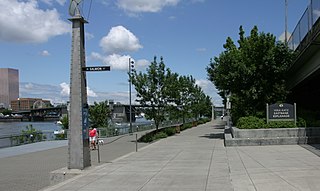
The Eastbank Esplanade is a pedestrian and bicycle path along the east shore of the Willamette River in Portland, Oregon, United States. Running through the Kerns, Buckman, and Hosford-Abernethy neighborhoods, it was conceived as an urban renewal project to rebuild the Interstate 5 bicycle bypass washed out by the Willamette Valley Flood of 1996. It was renamed for former Portland mayor Vera Katz in November 2004 and features a statue of her near the Hawthorne Bridge.

Vera Katz was an American Democratic politician in the state of Oregon. She was the first woman to serve as Speaker of the Oregon House of Representatives and was the 49th mayor of Portland, Oregon's most populous city. She grew up in New York City, moving to Portland in 1962, and was elected to the Oregon House in 1972. She served as mayor from 1993 to 2005.
Rigga, stylized as RIGGA, is a group of artists and architects based in Portland, Oregon.
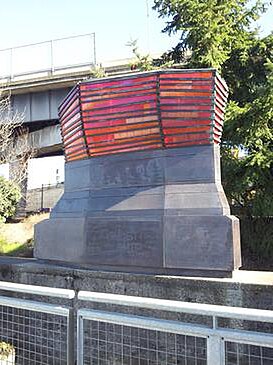
Ghost Ship is an outdoor 2001 sculpture by James Harrison and Rigga, a group of local artists, located along the Eastbank Esplanade in Portland, Oregon. It is made of copper, stainless steel, art glass, and two lamps. It is part of the City of Portland and Multnomah County Public Art Collection courtesy of the Regional Arts & Culture Council.
Mimir is an outdoor bronze and concrete sculpture by Keith Jellum, installed in northwest Portland, Oregon, United States. The 1980 sculpture was commissioned by the Portland Development Commission and Tom Walsh of Tom Walsh Construction, and is part of the City of Portland and Multnomah County Public Art Collection courtesy of the Regional Arts & Culture Council.

Echo Gate is an outdoor 2001 sculpture by Ean Eldred and the architectural firm Rigga, located along the Eastbank Esplanade in Portland, Oregon, United States. It was funded by the City of Portland Development Commission's Percent for Art program, and is part of the City of Portland and Multnomah County Public Art Collection courtesy of the Regional Arts & Culture Council.

Running Horses is an outdoor 1986 bronze sculpture by Tom Hardy, located on the Transit Mall in downtown Portland, Oregon. It is part of the City of Portland and Multnomah County Public Art Collection courtesy of the Regional Arts & Culture Council.
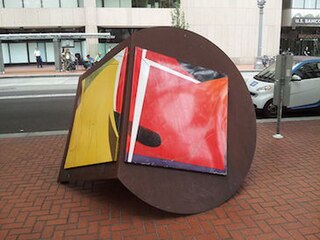
Untitled is an outdoor 1977 steel and porcelain enamel sculpture by American artist John Killmaster, located in downtown Portland, Oregon. It is part of the City of Portland and Multnomah County Public Art Collection courtesy of the Regional Arts & Culture Council.

118 Modules is an outdoor 1979 sculpture by American artist John Rogers, located at the parking garage at Southwest Yamhill Street between Southwest 9th and 10th Avenues in downtown Portland, Oregon.

Vera Katz, also known as Mayor, Vera Katz, is an outdoor bronze sculpture depicting Vera Katz created by American artist Bill Bane. Unveiled in 2006, it is located along the Eastbank Esplanade in Portland, Oregon. Katz, a former mayor of the city between 1993 and 2005, supported arts and culture during her tenure and established Oregon's Percent for Art program. She was also instrumental in developing the Eastbank Esplanade, which is named after her. The sculpture has received a mostly positive reception and has inspired people to adorn it with clothing, flowers and makeup.

Untitled is an outdoor 1977 painted aluminum sculpture by Ivan Morrison, located at Southwest 5th Avenue and Southwest Oak Street in the Transit Mall of Portland, Oregon.

Stack Stalk is an outdoor 2001 sculpture by Ean Eldred and the architectural firm Rigga, located along the Eastbank Esplanade in Portland, Oregon.

Tikitotmoniki Totems is a series of four outdoor 2001 sculptures by American artist Kenny Scharf, located at Jamison Square in Portland, Oregon.
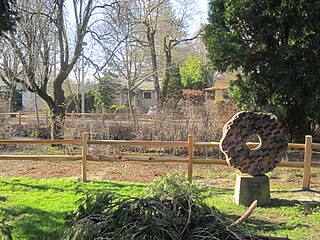
Uroboros is an outdoor 1979 sculpture by Charles Kibby, located at Westmoreland Park in the Sellwood neighborhood of southeast Portland, Oregon. It is a modern depiction of the uroboros, an ancient Egyptian and Greek symbol depicting a serpent or dragon eating its own tail.
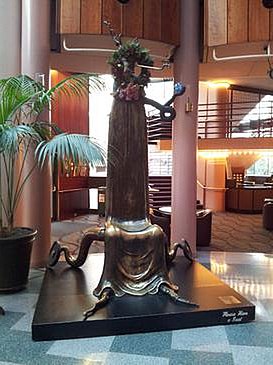
Mago Hermano (Brother Wizard or Magician) is a 2003 bronze and steel sculpture by Mexican artist Alejandro Colunga, located in the lobby of Antoinette Hatfield Hall (part of Portland Center for the Performing Arts), at 1111 Southwest Broadway, in Portland, Oregon, United States.

Triad is an outdoor sculpture by German American artist Evelyn Franz, located in Laurelhurst Park in southeast Portland, Oregon.

Whistlestop for an Organ Teacher is an outdoor 2009 stainless steel sculpture by American artist Cris Bruch, located in Portland, Oregon.

Burls Will Be Burls is an outdoor 2009 bronze sculpture by American artist Bruce Conkle, located in Portland, Oregon.
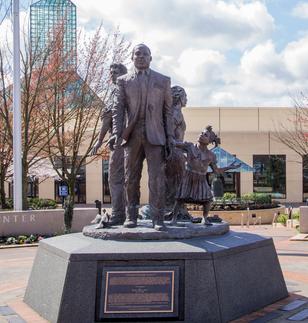
The Dream, also known as the Dr. Martin Luther King Jr. Memorial Sculpture, is an outdoor bronze sculpture of Martin Luther King Jr. by Michael Florin Dente, located outside the Oregon Convention Center in Portland, Oregon. The 8-foot (2.4 m) memorial statue was dedicated on August 28, 1998, the 35th anniversary of King's "I Have a Dream" speech. It depicts King plus three allegorical sculptures: a man who symbolizes the American worker, a woman who represents immigration, and a young girl shown releasing King's coattail, who represents, according to Dente, the "letting go" that occurs when people sacrifice their time and energy to engage in a struggle. The sculpture is part of the City of Portland and Multnomah County Public Art Collection, courtesy of the Regional Arts & Culture Council.

Daddy Long Legs is an outdoor 2006 painted aluminum sculpture by Mel Katz, located in Portland, Oregon, United States. It is maintained by the Regional Arts & Culture Council.




















